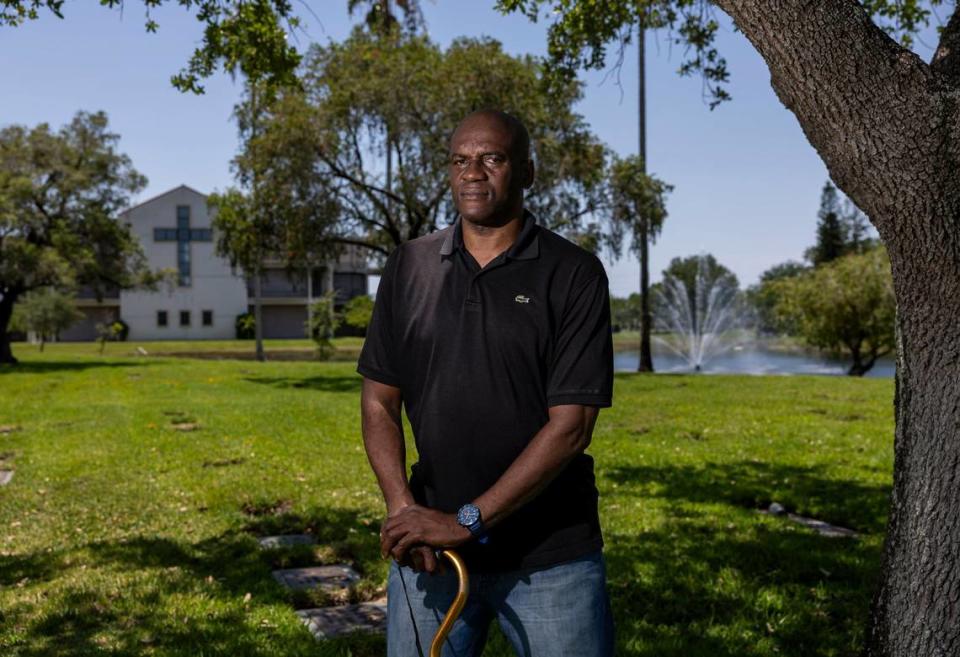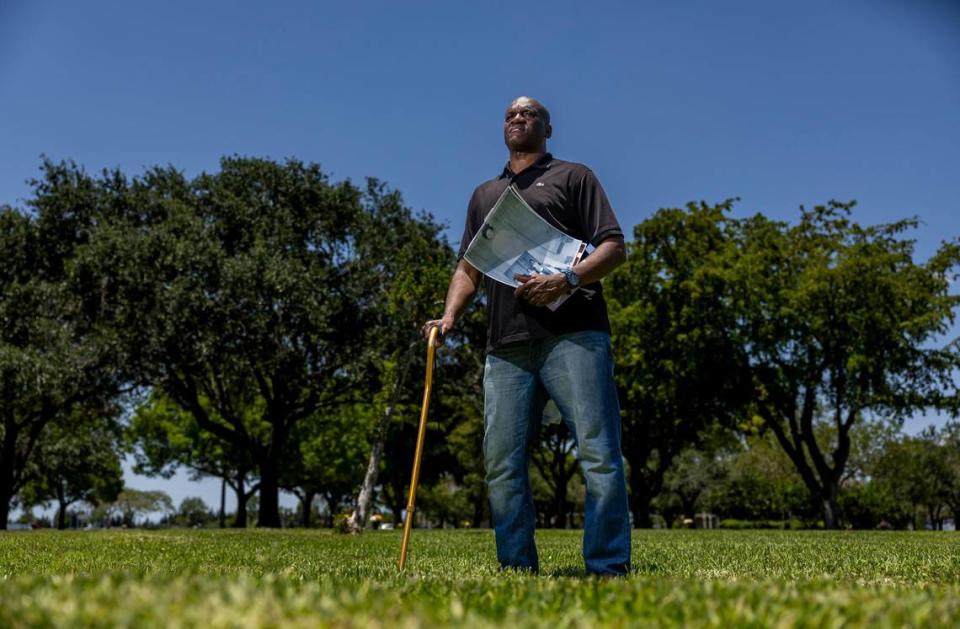‘They were murdered but they were here.’ A Haitian migrant’s quest to honor mom, siblings
For as long as he can remember, Augustin Lorfils had refused to confront the tragedy that had defined his life, which made national headlines but remained a taboo subject even within his immediate family.
That all changed a few years ago when a chance encounter with a guest at the South Beach hotel where he worked began to provides to answers to questions he had long had.
“He asked ‘What’s your story?’” Lorfils recalled the guest, a lawyer, asking him. “Everybody’s got a story.”
Not ready to share, he at first walked away. But the next day, Lorfils finally opened up.
His mother, Eliane Lorfils, 31, and five siblings drowned after they were pushed into the rough seas of the Atlantic about a quarter-mile off the coast of Florida by gun-wielding smugglers ferrying them and other Haitian migrants in a 28-foot speedboat from The Bahamas.
The shocking incident, which took place on Aug. 13, 1979, off Palm Beach, has the dubious distinction of being the first documented case of Haitian refugees dumped at sea.
Now, 45 years later, Augustin is not only ready to talk about it but he wants to have his mother and siblings remembered. Their grave site at an Archdiocese of Miami cemetery remains a patch of grass of unmarked graves, and he wants to place headstones.
“I want people to remember them,” he said. “They were murdered but they were here. They were human beings too. If you go to the graveyard... other people have headstones.”
Lorfils’ journey to this moment has not been easy. Though he and his younger sister, Emma, attended the funerals in 1979, they didn’t go to the burial and never knew where their mother was buried. Their father, Dumercy Lorfils, who was too distraught to attend, never spoke of the deaths with them.
“We never talked about it,” Lorfils, 53, said. “It was taboo.”
The first information about where the graves were located came courtesy of the lawyer, who after speaking to Lorfils did some research and days later provided him with not only the burial site but also the name of one of the smugglers. Jeffrey B. Hastings was convicted of six counts of manslaughter and sentenced to 180 years in prison for the deaths. He remains behind bars.
“How can you throw people, kids in the water?” Lorfils said, still struggling even now over his family’s tragedy.
The Florida Straits are littered with the washed out dreams of migrants, many of them Haitian, who perished at sea either because of rickety boats or unscrupulous smugglers. Elaine Lorfils and her children, ages 4 to 11, were recorded as the first, in what would be a list of similar tragedies as Haitians — and Cubans — have sought to make it to freedom.
This isn’t lost on Lorfils, who recognizes that the ocean is filled with the dead, but wants to ensure his family is remembered beyond the newspaper clippings or memories of the day.
“I felt like a bad son,” he said, choking back tears, as he recalled the first time he visited Our Lady of Mercy Catholic Charity Cemetery in Doral and saw there were no grave markers. “I felt like I didn’t do what I was supposed to do for my mom and my brothers and sisters. It was an empty space.”
The first Haitian ‘boat people’
The first Haitian “boat people” began arriving in South Florida in 1972, seven years before the Lorfils family tragedy. The Haitians’ arrival marked the beginning of a period of protests, detention and eventually triumph as the new refugees with French-sounding surnames challenged U.S. immigration and detention policies.
While the Lorfils tragedy underscored their desperate plight as they sought to escape the oppression of the Duvalier regime in Haiti and the increasingly unwelcoming landscape of The Bahamas, it also showed the outpouring of support from South Florida for its newest immigrants.

The plots where Elaine Lorfils and her children are buried were donated by Our Lady of Mercy Catholic Cemetery, according to an article on the Archdiocese of Miami website. The caskets were donated by Poitier Funeral Home, and the dresses for the girls, Lorfils has since learned, were donated by late WPLG-Channel 10 news anchor Ann Bishop.
“There is always something that takes place like no other incident that always brings people together. You never know when it’s going to happen or where it’s going to take place. But eventually, whatever happens is going to bring people together,” said Bernard Poitier, Jr., whose father founded Poitier Funeral Home.
The younger Poitier, who was present at the funeral, said his father always remembered the tragedy and before he died in 2021 asked his son to make sure the graves had headstones. The conversation occurred while the two were at the site and the elder Poitier walked over to where the family was laid to rest and he realized the area was just as he had left it in 1979.
“He said, ‘It’s been a long time. This should have been done,’ ” Poitier Jr. recalled his father saying about the missing headstones. “He made me promise that this would get done.”
As he embarked on a journey to carry out his father’s promise, Poitier Jr. had no idea that Lorfils was also finally coming to terms with the deaths and was ready to do something. They have since teamed up in hopes of either getting the markers donated, or getting $15,000 in donations to purchase them.
At the time Lorfils was coming to terms with his life’s story, Poitier had set out on his own journey in search of members of the family.
‘God opens doors’
“This has not been easy because at times I wanted to give up and forget about it,” Poitier Jr. said, adding that he has found inspiration from bible verses, Revelation 3:7-8.
“The verse talks about God showing you a way when you think all hope is lost. “It says God opens up doors that no man can close and closes doors that no man can open. That was my inspiration to continue.”
Poitier Jr. was among those who attended the funeral inside St. Mary’s Cathedral in 1979. He still remembers the outpouring of grief inside.
“To be at that service and to see the emotions that that service brought on was really incredible,” he said.

In an interview with the Miami Herald in 1998, on the 19th anniversary of the tragedy, Dumercy Lorfils opened up about how he had been affected by the loss of his wife and children.
“I don’t know why I did not die,” he said in a soft-spoken voice, tears welling up in his left eye. “I lost five children and a wife.”
The elder Lorfils wasn’t on the boat and said he was shocked to learn that his wife and children were.
Though he had arrived by boat a year earlier with Augustin, then 8, and Emma, 7, the family patriarch said he had sent $1,500 to The Bahamas for his wife to come by plane with the other children.
With no photo of his wife or kids, his only memento was a photo showing him shirtless and being consoled by his sister-in-law after hearing the news.
“My dad died the day my mom died; when my brothers and sisters died, that’s when he died too,” Augustin Lorfils, breaking down in tears, said.
Father and son had a strained relationship. There was always an impenetrable wall, Lorfils said, which he is only now starting to understand as he confronts his own pain and anger over what happened.
“He tried to be strong and tried to be there for me, my sister, but he was never the same,” he said. “He got up in the morning to go work; made sure I had a place to stay, but he never really talked about it.”
In 2008, at age 65, the elder Lorfils died in North Miami after suffering a stroke. His children buried him at Our Lady of Mercy Catholic Cemetery to be close to their mother and children.
“We want to be buried there,” said Lorfils said of him and his sister. “I want to be near them.”
Last year, Augustin Lorfils also had a stroke and was later diagnosed with multiple sclerosis, an autoimmune disorder. He moves slowly these days. Instead of the man who ran 10 miles a day as recently as two years ago, he now moves with the aid of a cane. Both realities have also made him more reflective— and ready to confront what he had spent his life avoiding.
“I really never got deep with people. I was always scared to connect because I was scared something was going to happen,” he said.
After years of anger toward his family’s killers, he also had to get to a point “where I had to forgive to deal with life,” said Lorfils, who among his belongings has a photo of Hastings, who was sentenced to 30 years for each of the Lorfils victims and has been repeatedly denied parole.
Lorfils feels a pressing urgency to finally put the headstones in place. Several years ago, a cousin thought he was finally strong enough and gave him the only photo of his mother, a black-and-white image of Eliane Lorfils standing in a photo studio. There was also another photo of some of his five siblings.
The children’s name at the time of the tragedy were reported as Demavil, 11; Yvonne, 7; Kevis, 6, Antionette, 5, and Michel, 4.
Lorfils says he still doesn’t know their dates of birth. Along with trying to raise the money for the headstones, he’s now hoping to track down the information to go on them. On Monday, he saw progress when he received from The Bahamas the birth certificate of one of his sisters, Antionette.
Five years old at the time of her drowning, she had just had a birthday on Aug. 10, three days before she and the others onboard the ill-fated journey were pushed to their deaths.

